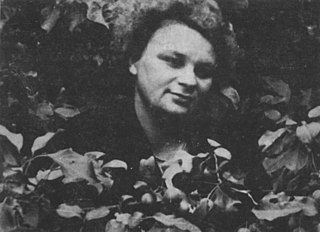A Quote by William Carlos Williams
We sit and talk quietly, with long lapses of silence, and I am aware of the stream that has no language, coursing beneath the quiet heaven of your eyes, which has no speech.
Related Quotes
Silence is difficult and arduous; it is not to be played with. It isn't something that you can experience by reading a book, or by listening to a talk, or by sitting together, or by retiring into a wood or a monastery. I am afraid none of these things will bring about this silence. This silence demands intense psychological work. You have to be burningly aware - aware of your speech, aware of your snobbishness, aware of your fears, your anxieties, your sense of guilt. And when you die to all that, then out of that dying comes the beauty of silence.
What a thing it is to sit absolutely alone, in the forest, at night, cherished by this wonderful, unintelligible, perfectly innocent speech, the most comforting speech in the world, the talk that rain makes by itself all over the ridges, and the talk of the watercourses everywhere in the hollows! Nobody started it, nobody is going to stop it. It will talk as long as it wants this rain. As long as it talks I am going to listen.
This silence, this moment, every moment, if it's genuinely inside you, brings what you need. There's nothing to believe. Only when I stopped believing in myself did I come into this beauty. Sit quietly, and listen for a voice that will say, 'Be more silent.' Die and be quiet. Quietness is the surest sign that you've died. Your old life was a frantic running from silence. Move outside the tangle of fear-thinking. Live in silence.
Our view of man will remain superficial so long as we fail to go back to that origin [of silence], so long as we fail to find, beneath the chatter of words, the primordial silence, and as long as we do not describe the action which breaks this silence. the spoken word is a gesture, and its meaning, a world.
Have you never observed that children will sometimes, of a sudden, give utterance to ideas which makes us wonder how they got possession of them? Which presuppose a long series of other ideas and secret self-communings? Which break forth like a full stream out of the earth, an infallible sign that the stream was not produced in a moment from a few raindrops, but had long been flowing concealed beneath the ground?
We can learn to trust ourselves by inquiring within. To practice doing this, sit quietly, close your eyes, and for a minute focus your attention on your breathing. Gently visualize your inner wisdom as a graceful butterfly. Admire her beauty, and encourage your butterfly to sit on your shoulder and whisper her wisdom in your ear. Be still and listen.
For language to have meaning, there must be intervals of silence somewhere, to divide word from word and utterance from utterance. He who retires into silence does not necessarily hate language. Perhaps it is love and respect for language which imposes silence upon him. For the mercy of God is not heard in words unless it is heard, both before and after the words are spoken, in silence.




































